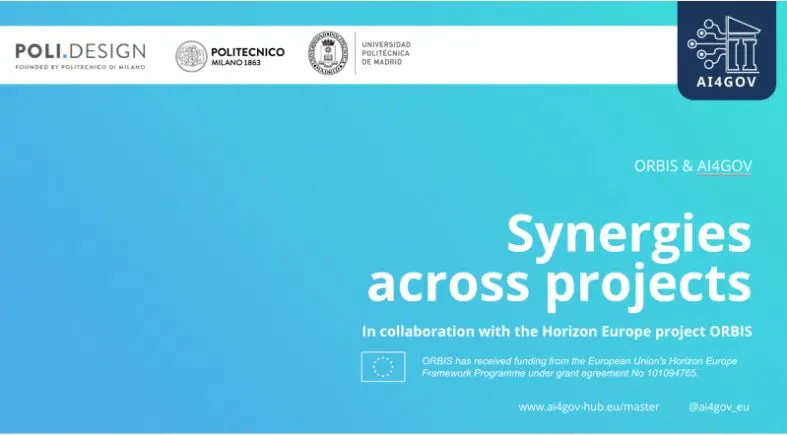A collaboration between two projects that bridges advanced research with academic learning
The Horizon Europe ORBIS project (coordinated by Francesca Rizzo, with Grazia Concilio, Ilaria Mariani, and Anna Moro) has successfully synergised with the Artificial Intelligence for Public Services (AI4GOV) Master Program at POLI.design, particularly within Project Work 3 (PW3)— a five-week module focused on AI for active listening and citizen participation, led by Ilaria Mariani (representing the ORBIS coordination team) and Oscar Corcho, with Riccardo Ventura. This collaboration between the two projects bridges advanced research with academic learning, offering students hands-on engagement with real-world AI applications in governance.
The ORBIS project entered the class bringing its insights and learnings with contributions spanning from findings from user research and analysis of deliberative democracy settings which informed the design of digital tools to favour participation, up to a training event with live demonstrations of the ORBIS solution and AI-tools.
Needs & Insights from CEPS, an ORBIS Pilot. A Keynote by Berta Mizsei
Berta Mizsei is a researcher at the Centre for European Policy Studies (CEPS), specializing in public participation, digital services, and democracy in the EU. Her work focuses on the ethical, legal, and socio-economic aspects of emerging technologies and their impact on governance.
In her keynote, Berta Mizsei addressed how AI-driven tools can be leveraged to enhance citizen participation in EU policy making. She emphasised the significance of digital deliberation, explaining how AI can bridge the gap between citizens and policymakers, ensuring that decision-making is more transparent, inclusive, and data-driven.
Key Discussion Points
- Challenges in Digital Participation – Issues such as trust, accessibility, and digital skills gaps must be addressed to ensure effective e-governance.
- AI’s Role in Deliberative Democracy – How AI can be used to enhance active listening and foster more dynamic, large-scale citizen engagement.
- The Ethical and Legal Framework – Considerations regarding privacy, data protection, and inclusivity in AI-enhanced democratic tools.
The keynote was followed by an interview conducted by the Master cohort, structured to gather insights on the needs and challenges faced by two primary groups: moderators and policymakers. The interview addressed critical topics, including the representation of contributions in debates, the impact of citizen input on policy making, the importance of communicating initiatives and embracing diversity, the barriers posed by digital literacy to e-participation, the essential role of moderation, and ultimately, it broadened the discussion to emphasize the importance of creating productive environments that foster inclusive debates while ensuring credibility and accountability.
Key Takeaways
- AI can enhance democracy by enabling large-scale, data-driven public participation.
- Trust and inclusivity remain key challenges that must be addressed for AI-enhanced governance tools to be effective.
- Collaboration between researchers and policymakers is essential to align AI innovations with public needs.
Lucas Anastasiou: Training event on ORBIS Platforms and Toolkit
As part of Project Work 3 (PW3) of the AI4GOV Master Program at Politecnico di Milano, a one hour and a half training event washeld featuring Lucas Anastasiou.
A key figure in the ORBIS project, Anastasiou is a specialist in AI-driven solutions for active listening and civic participation. His expertise focuses on integrating AI technologies into digital governance frameworks, with a particular emphasis on deliberative democracy.
The session started explaining the ORBIS socio-technical solution and its AI tools aimed at supporting citizen participation in deliberation, to then dive deep into a training event with a live demonstration.
The live demonstration focused on showing the ORBIS Toolkit, with a spotlight on BCause, an AI-powered deliberation platform designed to foster inclusive digital dialogues, and Democratic Reflection.
Through an interactive format, the training allowed a cohort of almost 30 students to engage directly with how AI tools can support deliberative democracy, from summarising, to clustering and extracting arguments.
Key Takeaways
- AI tools like BCause can support large-scale civic participation by facilitating structured, inclusive, and analyzable deliberations.
- Real-time demonstrations of platforms help demystify AI’s role in public service and strengthen user trust.
Concluding thoughts
The sessions provided an inspiring perspective on the intersection of AI and public participation, demonstrating the relevance of engaging citizens and stakeholders along the design process for informing the development of AI-enhanced tools, these initiatives are paving the way for a more desirable, inclusive, transparent, and data-driven deliberation and democracy.
